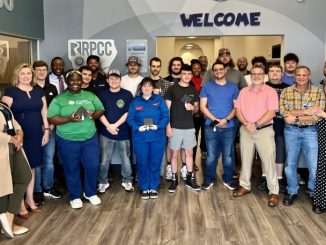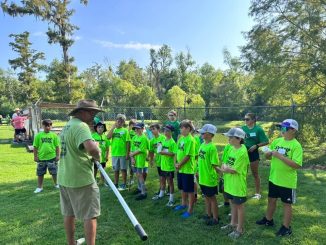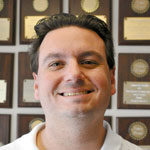
A 36-year-old husband and father of two, Luling’s Christopher Cordaro’s life took an unexpected and unwelcome turn in September of last year when he was diagnosed with stage 4 cancer. He was told by doctors that the rare and aggressive illness could be treated, but not cured.
Now, the cancer is nowhere to be found.
Cordaro’s life has been nothing short of an emotional roller coaster for the better part of the past year since his diagnosis. The cancer he was found to have was high grade neuroendocrine carcinoma affecting the pancreas, liver, bone, spine, scalp and multiple lymph nodes. It was described to him by doctors as being an exceptionally rare form of cancer.
It came as a shocking blow to Cordaro, who was living an extremely active and seemingly healthy life. He ran regularly, played soccer and worked full time with the New Orleans Saints and Pelicans organizations as a sales account executive.
“When you’re 36, healthy, nothing holding you back at all … you don’t expect it at all,” he said. “I said, ‘No, that can’t be right.’ But then you look at the scan, and it’s lit up with red like the Fourth of July.”
Cordaro said he’d had respiratory issues leading up to the diagnosis, but assumed those things stemmed from allergies or perhaps his past broken nose suffered while playing soccer. Of greater concern were some lesions he discovered on his scalp and one on his shoulder, but though it prompted him to get checked, the possibility of cancer was far removed from his mind, let alone an advanced stage of it.
At first, his doctors seemed of the same thought process — a lesion he had checked was thought to be 90 percent benign, and Cordaro thought it was only a matter of time before he’d receive a relatively clean bill of health.
It wasn’t the case. Hints of cancer appeared on his test results, and once it was looked deeper into, the worst news materialized.
“We thought we’d dodged a bullet,” Cordaro said. “From day one, it’s been so back and forth. You think you’re out of the woods, then not only aren’t you, but it’s stage 4 cancer. The doctor told me, ‘Look, we can’t get rid of this.’ You just try to stay positive, but we didn’t receive much good news.”
The lack of good news wasn’t for lack of trying.
The Cordaros visited specialists around the country, including doctors in Houston, Kentucky and Denver. At one point, he was told to get his affairs in order and make every effort to, while he could, enjoy every moment with his young children, who are two and five years old, respectively.
His situation was dire. Incredibly, it wouldn’t stay that way.
Cordaro began chemotherapy, and after three treatments, things began moving in the right direction. Cordaro maintained a belief that “we’re going to beat this,” in the face of all odds, and his body soon seemed to believe it as well. He went through eight rounds of heavy treatment over an eight month span. Each time, the tumors in his body shrunk.
At the same time, he combated the illness from a spiritual and emotional place as well, finding help and comfort from friends, family and his faith. He and his wife began to visit the Father Seelos Shrine in New Orleans and Sister Dulce’s Cypress Springs Mercedarian Prayer Center in Baton Rouge to find a sense of peace.
Then, in February, scans indicated something entirely unexpected: there was no evidence of disease.
“The highs and lows of it all, I admit, have been jarring,” Cordaro said. “You hear and you read about this disease and you don’t find much hope. The best thing I thought I could have hoped for was for treatment to shrink the tumor enough to where I’d be a candidate for surgery — hadn’t been, before — and it was beyond that. They couldn’t find a trace of it.”
In May, a follow-up scan revealed the same thing, that no indication of the cancer was discovered.
“That scan wasn’t lit up at all this time,” he said. “That wasn’t thought to be possible. It was amazing to see.”Not just for Cordaro, at that.
“My doctor told me he had never seen this kind of what he called a complete response (to treatment),” he said. “It was stage 4, as in, this is everywhere, not just in one spot or something. To know and understand that and then go in and get this news, it was a miraculous turnaround.”
While doctors haven’t given him a completely clean bill of health, noting the cancer could resurface, his outlook is much more positive.
Something that worked in Cordaro’s favor was the grueling chemotherapy treatment he underwent would probably have not been an option for older or elderly patients, but his relative youth, health and conditioning allowed him to pursue recovery to the maximum degree.
“I’ll be honest, there were days that were really tough,” he said. “The treatment is harsh. Days when I had no energy to be with my kids, no energy to even listen to or focus on what people were saying to me. The good news was that I was healthy enough to undergo that treatment. If I were 70 or 80, they basically wouldn’t be able to even treat me. It could kill an older person.”
Cordaro said part of his coping mechanism has been his strong foundation of religious faith, which he also believes has been tantamount to his ultimate healing process thus far. He hopes his story can provide hope for those in need of it.
“I look at it like this … nobody gets out alive, in the end,” Cordaro said. “It could be a car crash, anything. A sermon by the father at our church expressed the idea that life isn’t about the date at the beginning or at the end of your tombstone, but about that dash in-between them. It’s about what you do. So if I can help anybody, give them hope, that’s what I’d like to do. We see so much negativity in the media, and sometimes we just need to hear and see some positive things.”





Be the first to comment